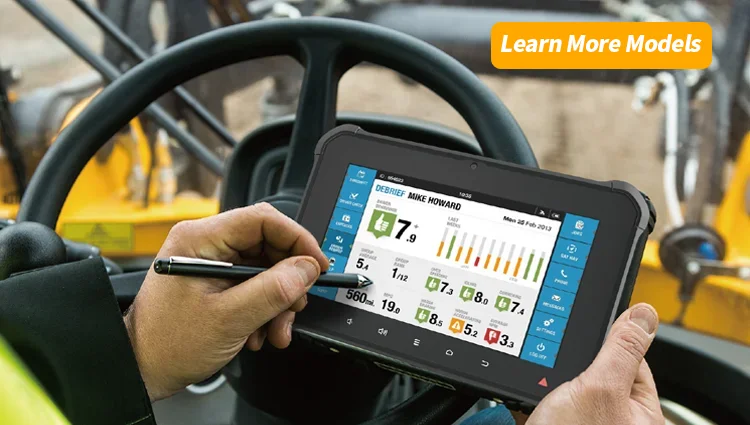Home > Blog > 7 Reasons Why Rugged Tablets Are Revolutionizing Fleet Management in 2025
7 Reasons Why Rugged Tablets Are Revolutionizing Fleet Management in 2025
Time: 2025-04-09 Editor: Hitekon Rugged Tablet Manufacturer
- Introduction: The Backbone of Modern Fleet Operations
- Why Fleet Management Needs Rugged Tablets in 2025
- 1. Unmatched Durability for Harsh Environments
- 2. Real-Time Data Collection and GPS Tracking
- 3. Seamless Integration with Fleet Management Software
- 4. Extended Battery Life for Long Routes
- 5. Enhanced Driver Safety and Communication
- 6. Cost Efficiency Over Time
- 7. Regulatory Compliance and Paperless Workflow
- FAQs: Rugged Tablets for Fleet Management
- Conclusion: The Smarter Road Ahead
Introduction: The Backbone of Modern Fleet Operations
In todayŌĆÖs fast-paced logistics and transportation world, real-time data, seamless communication, and operational durability arenŌĆÖt luxuriesŌĆötheyŌĆÖre absolute necessities. Enter the rugged tablet for fleet management: a powerful, resilient, and smart solution designed to transform how fleets are monitored, managed, and maintained.
Fleet managers across industriesŌĆöfrom logistics to public transportŌĆöare investing in rugged tablets to streamline workflows, reduce downtime, and gain a competitive edge. But what makes these devices indispensable? LetŌĆÖs explore how rugged tablets are not just meeting industry needsŌĆötheyŌĆÖre exceeding them.
Why Fleet Management Needs Rugged Tablets in 2025
1. Unmatched Durability for Harsh Environments
Fleet vehicles often operate under extreme conditionsŌĆödusty roads, wet weather, vibrations, and accidental drops. Standard tablets simply canŌĆÖt survive. Rugged tablets are purpose-built with MIL-STD-810H certification, water and dust resistance (typically IP65 or higher), and reinforced exteriors. This means reliable performance regardless of the environment, whether you’re tracking deliveries in the desert or managing a construction vehicle in the rain.
Statistic: Downtime due to equipment failure can cost fleets up to $760 per vehicle per day. Rugged tablets help minimize this risk dramatically.
2. Real-Time Data Collection and GPS Tracking
Fleet management thrives on accurate data. Rugged tablets come with built-in GNSS/GPS, cellular connectivity (4G/5G), and Bluetooth, ensuring fleet managers can monitor vehicle locations, speed, idle time, and routes in real-time. This leads to smarter route optimization, reduced fuel costs, and improved driver accountability.
3. Seamless Integration with Fleet Management Software
A major advantage is that rugged tablets run enterprise-grade software, whether Android or Windows-based. They integrate effortlessly with platforms like Geotab, Verizon Connect, Samsara, and more, making them an ideal all-in-one tool for dispatching, diagnostics, maintenance logs, and driver communication.
4. Extended Battery Life for Long Routes
Fleet operations can last 12+ hours daily. Rugged tablets are equipped with high-capacity lithium-polymer batteries, often supporting hot-swapping or extended-use batteries. That means uninterrupted access to essential apps and data throughout the workday.
5. Enhanced Driver Safety and Communication
With features like voice command, hands-free communication, and real-time alerts, rugged tablets improve driver safety. They also enable two-way communication between drivers and fleet managers, promoting faster issue resolution and clearer updates.
6. Cost Efficiency Over Time
While rugged tablets may have a higher upfront cost, their longevity and reliability make them a cost-effective investment. Reduced downtime, lower repair rates, and improved productivity result in substantial long-term ROI.
Fun Fact: Rugged tablets have an average lifespan of 5+ years, compared to just 2ŌĆō3 years for consumer devices.
7. Regulatory Compliance and Paperless Workflow
With ELD (Electronic Logging Device) mandates and emission tracking regulations, rugged tablets help ensure compliance through automated logs, secure data capture, and easy reporting. Fleet managers can also digitize inspections, invoices, and work orders, eliminating paperwork and boosting efficiency.
FAQs: Rugged Tablets for Fleet Management
Q1: How do rugged tablets differ from regular tablets?
Rugged tablets are built to military and industrial standards, with resistance to extreme temperatures, shocks, moisture, and dust. TheyŌĆÖre engineered for the field, not the office.
Q2: Are rugged tablets customizable for different fleet needs?
Absolutely. From barcode scanners and RFID readers to vehicle dock stations and external antennas, rugged tablets can be tailored to any fleet scenario.
Q3: What operating systems do rugged tablets use?
Most rugged tablets run Android or Windows 10/11, allowing flexibility in app selection and enterprise system compatibility.
Q4: Are rugged tablets secure for sensitive data?
Yes. Enterprise-grade rugged tablets offer encryption, secure boot, remote wipe, and MDM (Mobile Device Management) capabilities for data protection.
Q5: How are rugged tablets mounted in vehicles?
They use specialized docking stations or mounting brackets that ensure secure attachment, charging capabilities, and easy access for drivers.
Conclusion: The Smarter Road Ahead
Fleet management is evolvingŌĆöand rugged tablets are at the heart of that transformation. They offer a rare combination of durability, intelligence, and connectivity, delivering mission-critical capabilities in the most demanding environments. Whether you manage a dozen delivery vans or a nationwide logistics network, integrating rugged tablets into your fleet strategy isnŌĆÖt just a smart moveŌĆöitŌĆÖs a future-proof one.
If youŌĆÖre looking to reduce operational costs, enhance fleet visibility, and boost productivity, now is the time to upgrade your tech with rugged tablets purpose-built for the road ahead.
Previous’╝Ü How to Choose the Best Fleet Management Tablet?
Next’╝Ü Exploring the 8-Inch Vehicle Mount Rugged Computer: A Durable Tech Solution for Tough Jobs
Copyright © 2025.Hitekon All rights reserved.





